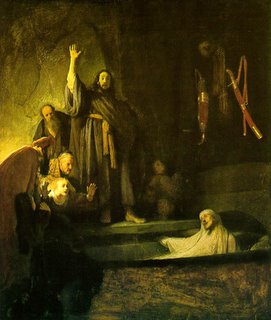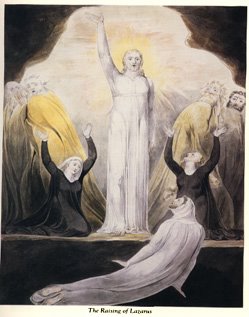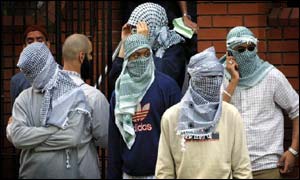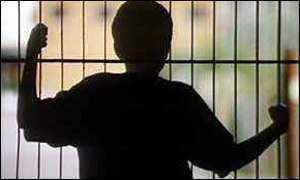****
Nathaniel Hawthorne, The Celestial Railroad
Not a great while ago, passing through the gate of dreams, I visited that region of the earth in which lies the famous City of Destruction. It interested me much to learn that by the public spirit of some of the inhabitants a railroad has recently been established between this populous and flourishing town and the Celestial City. Having a little time upon my hands, I resolved to gratify a liberal curiosity by making a trip thither. Accordingly, one fine morning after paying my bill at the hotel, and directing the porter to stow my luggage behind a coach, I took my seat in the vehicle and set out for the station-house....
A large number of passengers were already at the station-house
 awaiting the departure of the cars. By the aspect and demeanor of these persons it was easy to judge that the feelings of the community had undergone a very favorable change in reference to the celestial pilgrimage. It would have done Bunyan's heart good to see it. Instead of a lonely and ragged man with a huge burden on his back, plodding along sorrowfully on foot while the whole city hooted after him, here were parties of the first gentry and most respectable people in the neighborhood setting forth towards the Celestial City as cheerfully as if the pilgrimage were merely a summer tour. Among the gentlemen were characters of deserved eminence--magistrates, politicians, and men of wealth, by whose example religion could not but be greatly recommended to their meaner brethren. In the ladies' apartment, too, I rejoiced to distinguish some of those flowers of fashionable society who are so well fitted to adorn the most elevated circles of the Celestial City. There was much pleasant conversation about the news of the day, topics of business and politics, or the lighter matters of amusement; while religion, though indubitably the main thing at heart, was thrown tastefully into the background. Even an infidel would have heard little or nothing to shock his sensibility.
awaiting the departure of the cars. By the aspect and demeanor of these persons it was easy to judge that the feelings of the community had undergone a very favorable change in reference to the celestial pilgrimage. It would have done Bunyan's heart good to see it. Instead of a lonely and ragged man with a huge burden on his back, plodding along sorrowfully on foot while the whole city hooted after him, here were parties of the first gentry and most respectable people in the neighborhood setting forth towards the Celestial City as cheerfully as if the pilgrimage were merely a summer tour. Among the gentlemen were characters of deserved eminence--magistrates, politicians, and men of wealth, by whose example religion could not but be greatly recommended to their meaner brethren. In the ladies' apartment, too, I rejoiced to distinguish some of those flowers of fashionable society who are so well fitted to adorn the most elevated circles of the Celestial City. There was much pleasant conversation about the news of the day, topics of business and politics, or the lighter matters of amusement; while religion, though indubitably the main thing at heart, was thrown tastefully into the background. Even an infidel would have heard little or nothing to shock his sensibility.One great convenience of the new method of going on pilgrimage I must not forget to mention. Our enormous burdens, instead of being carried on our shoulders as had been the custom of old, were all snugly deposited in the baggage car, and, as I was assured, would be delivered to their respective owners at the journey's end.....
It was late in the day when the train thundered into the ancient city of Vanity, where Vanity Fair is still at the height of prosperity, and exhibits an epitome of whatever is brilliant, gay, and fascinating beneath the sun. As I purposed to make a considerable stay here, it gratified me to learn that there is no longer the want of harmony between the town's-people and pilgrims, which impelled the former to such lamentably mistaken measures as the persecution of Christian and the fiery martyrdom of Faithful. On the contrary, as the new railroad brings with it great trade and a constant influx of strangers, the lord of Vanity Fair is its chief patron, and the capitalists of the city are among the largest stockholders. Many passengers stop to take their pleasure or make their profit in the Fair, instead of going onward to the Celestial City. Indeed, such are the charms of the place that people often affirm it to be the true and only heaven; stoutly contending that there is no other, that those who seek further are mere dreamers, and that, if the fabled brightness of the Celestial City lay but a bare mile beyond the gates of Vanity, they would not be fools enough to go thither. Without subscribing to these perhaps exaggerated encomiums, I can truly say that my abode in the city was mainly agreeable, and my intercourse with the inhabitants productive of much amusement and instruction.
It would fill a volume, in an age of pamphlets, were I to record all my observations in this great capital of human business and pleasure. There was an unlimited range of society--the powerful, the wise, the witty, and the famous in every walk of life; princes, presidents, poets, generals, artists, actors, and philanthropists,--all making their own market at the fair, and deeming no price too exorbitant for such commodities as hit their fancy. It was well worth one's while, even if he had no idea of buying or selling, to loiter through the bazaars and observe the various sorts of traffic that were going forward.
Some of the purchasers, I thought, made very foolish bargains. For instance, a young man having inherited a splendid fortune, laid out a considerable portion of it in the purchase of diseases, and finally spent all the rest for a heavy lot of repentance and a suit of rags. A very pretty girl bartered a heart as clear as crystal, and which seemed her most valuable possession, for another jewel of the same kind, but so worn and defaced as to be utterly worthless. In one shop there were a great many crowns of laurel and myrtle, which soldiers, authors, statesmen, and various other people pressed eagerly to buy; some purchased these paltry wreaths with their lives, others by a toilsome servitude of years, and many sacrificed whatever was most valuable, yet finally slunk away without the crown. There was a sort of stock or scrip, called Conscience, which seemed to be in great demand, and would purchase almost anything. Indeed, few rich commodities were to be obtained without paying a heavy sum in this particular stock, and a man's business was seldom very lucrative unless he knew precisely when and how to throw his hoard of conscience into the market. Yet as this stock was the only thing of permanent value, whoever parted with it was sure to find himself a loser in the long run. Several of the speculations were of a questionable character. Occasionally a member of Congress recruited his pocket by the sale of his constituents; and I was assured that public officers have often sold their country at very moderate prices. Thousands sold their happiness for a whim. Gilded chains were in great demand, and purchased with almost any sacrifice. In truth, those who desired, according to the old adage, to sell anything valuable for a song, might find customers all over the Fair; and there were innumerable messes of pottage, piping hot, for such as chose to buy them with their birthrights. A few articles, however, could not be found genuine at Vanity Fair. If a customer wished to renew his stock of youth the dealers offered him a set of false teeth and an auburn wig; if he demanded peace of mind, they recommended opium or a brandy bottle.
Day after day, as I walked the streets of Vanity, my manners and deportment became more and more like those of the inhabitants. The place began to seem like home; the idea of pursuing my travels to the Celestial City was almost obliterated from my mind. I was reminded of it, however, by the sight of the same pair of simple pilgrims at whom we had laughed so heartily when Apollyon puffed smoke and steam into their faces at the commencement of our journey. There they stood amidst the densest bustle of Vanity; the dealers offering them their purple and fine linen and jewels, the men of wit and humor gibing at them, a pair of buxom ladies ogling them askance, while the benevolent Mr. Smooth-it-away whispered some of his wisdom at their elbows, and pointed to a newly-erected temple; but there were these worthy simpletons, making the scene look wild and monstrous, merely by their sturdy repudiation of all part in its business or pleasures....
"Sir," inquired he, with a sad, yet mild and kindly voice. "do you call yourself a pilgrim?"
"Yes," I replied, "my right to that appellation is indubitable. I am merely a sojourner here in Vanity Fair, being bound to the Celestial City by the new railroad."

This incident made a considerable impression on my mind, and contributed with other circumstances to indispose me to a permanent residence in the city of Vanity; although, of course, I was not simple enough to give up my original plan of gliding along easily and commodiously by railroad. Still, I grew anxious to be gone. There was one strange thing that troubled me. Amid the occupations or amusements of the Fair, nothing was more common than for a person--whether at feast, theatre, or church, or trafficking for wealth and honors, or whatever he might be doing, to vanish like a soap bubble, and be never more seen of his fellows; and so accustomed were the latter to such little accidents that they went on with their business as quietly as if nothing had happened. But it was otherwise with me....
A steam ferry boat, the last improvement on this important route, lay at the river side, puffing, snorting, and emitting all those other disagreeable utterances which betoken the departure to be immediate. I hurried on board with the rest of the passengers, most of whom were in great perturbation: some bawling out for their baggage; some tearing their hair and exclaiming that the boat would explode or sink; some already pale with the heaving of the stream; some gazing affrighted at the ugly aspect of the steersman; and some still dizzy with the slumberous influences of the Enchanted Ground. Looking back to the shore, I was amazed to discern Mr. Smooth-it-away waving his hand in token of farewell.
"Don't you go over to the Celestial City?" exclaimed I.
"Oh, no!" answered he with a queer smile, and that same disagreeable contortion of visage which I had remarked in the inhabitants of the Dark Valley. "Oh, no! I have come thus far only for the sake of your pleasant company. Good-by! We shall meet again."
 And then did my excellent friend Mr. Smooth-it-away laugh outright, in the midst of which cachinnation a smoke-wreath issued from his mouth and nostrils, while a twinkle of lurid flame darted out of either eye, proving indubitably that his heart was all of a red blaze. The impudent fiend! To deny the existence of Tophet, when he felt its fiery tortures raging within his breast. I rushed to the side of the boat, intending to fling myself on shore; but the wheels, as they began their revolutions, threw a dash of spray over me so cold--so deadly cold, with the chill that will never leave those waters until Death be drowned in his own river--that with a shiver and a heartquake I awoke. Thank Heaven it was a Dream!
And then did my excellent friend Mr. Smooth-it-away laugh outright, in the midst of which cachinnation a smoke-wreath issued from his mouth and nostrils, while a twinkle of lurid flame darted out of either eye, proving indubitably that his heart was all of a red blaze. The impudent fiend! To deny the existence of Tophet, when he felt its fiery tortures raging within his breast. I rushed to the side of the boat, intending to fling myself on shore; but the wheels, as they began their revolutions, threw a dash of spray over me so cold--so deadly cold, with the chill that will never leave those waters until Death be drowned in his own river--that with a shiver and a heartquake I awoke. Thank Heaven it was a Dream!http://www.online-literature
****
I like to hike and climb and poke around in places where I don't belong. I'm going eventually to the undiscovered country, my visa awaiting. Till then, I hope you'll continue to join me and those here who wonder where we are and where we're going on this ood and often weird trip. It's a struggle to get through these things and after the sweating and the pains it seems we end up with everyone else after all; but still, it's somewhat different for us who made it on our own.
Or is it? We might ask Hamlet.
But that the dread of something after death,
The undiscovered country, from whose bourn
No traveler returns, puzzles the will
And makes us rather bear those ills we have,
Than fly to others we know not of.
(3.1.76-82)














